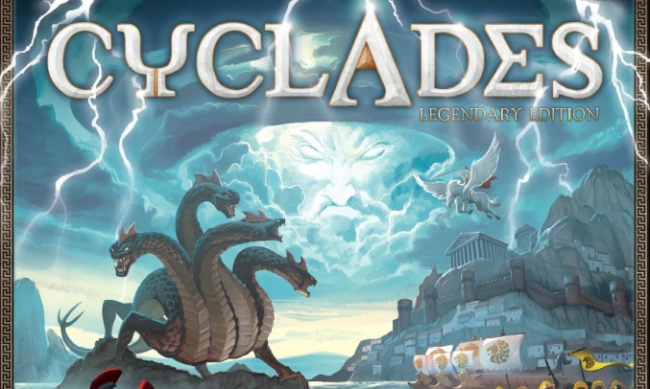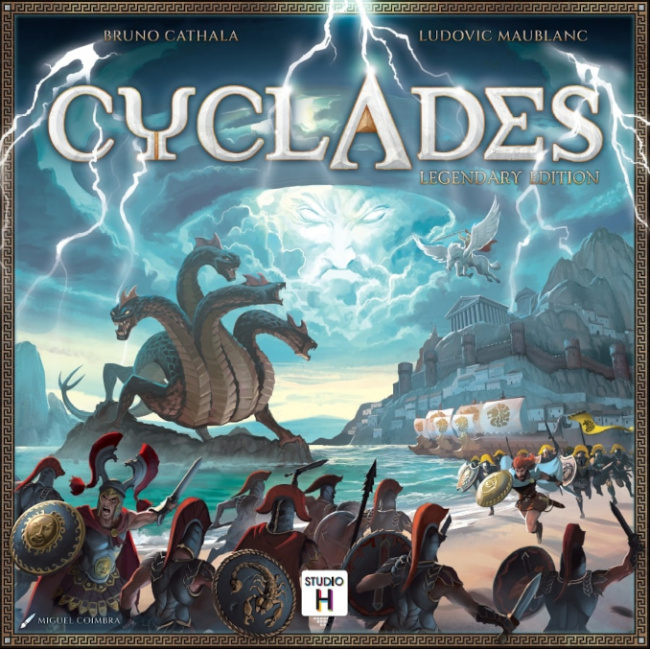Cyclades: Legendary Edition
Publisher: Open Sesame Games/Studio H
Release Date: April 2025
MSRP: $69.99
Designer(s): Bruno Cathala & Ludovic Maublanc
Format: Boxed board game
Number of Player: 2 to 6
Playing Time: 60 - 90 mins.
Age Rating: Age 14+
ICv2 Rating: 4 Stars out of 5
The original version of this game came out over fifteen years ago, and both the designers and the players have learned much over the years. The designers of the game took that experience and input from the players to redevelop this game, to make it smoother in its mechanics and potentially more interesting to a new audience.
Cyclades is an area control game of Greek heroics and mythology. Much of the game is focused on ways to gain the favor of the gods and of the figures that populate the myths and legends, whether heroic or monstrous. What makes this game unusual is the system which limits your access to the gods and to their favors. There are six gods who are listening to you, at least sometimes, but Apollo is the only one who is listening all of the time. The other gods rotate in and out of availability, in a pattern that is predictable but limiting.
Area control determines the resources you have for donating to the gods who are listening, but that works in a bidding format, so each listens to whoever donated the most. Each faction only rents the ear of one god or goddess on any given turn, so you are always able to gain someone’s favor, even if it isn’t your first choice. Your money is hidden behind a screen, which makes bidding more interesting. If you somehow bid more than you possess, the gods will punish you severely, so be careful in your counting!
You also need money for building armies, hiring mercenaries, and building ships, but the money is largely based on the resources of the areas you control, and you can increase both the number of areas and their individual values over the course of the game, with help from the gods, of course.
Apollo helps you build your finances. Ares helps you build your armies. Poseidon helps you build your navies and ports. Hera speeds up your ability to build buildings, and to hire mercenaries. Athena helps you build universities and gather philosophers. Zeus, being a "me first" kind of god, helps you build temples and gather priestesses. On any given turn, you can only win the favor of one of these gods, and the number of players determines how many are available on each turn.
One of the effects of these limits is that it’s less of a military game than it might appear, especially in lower player counts. The modular board is a variable map of islands, for which you can use the pre-designed configuration for your player count or design by player choice at the start of the game. Since you need ships, one of the limiting factors is the availability of Poseidon. When he’s not listening, no one can build ships. If neither Ares or Hera are handy, no one is adding to their armies. In addition, the armies and fleets are limited by the token count, which is small. Since only one god is listening per faction being played, the more factions in play, the quicker the gods cycle through their availability.
The rules vary, based on the number of players, because with two players, each one handles two factions on a 4-player map. For four or six players, you can play as teams. With three or five players, you play it as a free-for-all. Once everyone learns the mechanics, the turns are quick. Still, the six-player setup makes for a very crowded board, and the team interactions might bog down that version of the game.
Monsters and heroes can be summoned to your cause, but in the case of monsters, their attention span is short, and it’s costly to keep them around. The effects of monsters and heroes are varied, and only some of them are available on each turn, so careful selection of which ones will be the most helpful to you is a key to victory. Most heroes can help you win battles or build a metropolis, and most monsters can help you mess with your opponents, but the ways in which this happens vary widely.
Winning the game comes from one of two paths. If one faction builds up their lands to hold three cities of "metropolis" size, then they win. If one player is eliminated, that player loses and the winner is the faction that controls the most metropolis cities. If that is tied, the tiebreaker is the money of that faction. Partly as a result of this double path to victory, there are few catch-up mechanisms, so players will need to pay attention to their opponents, as one faction becoming dominant in the economics of the game will be devastating.
The components for the boxed version of the game are good, but since the locations of the heroes and monsters need to be visible at times, the standees are needed a lot, and the limited number of bases means that players are constantly switching the contents of the bases, creating extra wear and tear. The boards have nice artwork and clear borders. The wooden pieces used for armies and fleets are based on ancient Greek art, which gives the game a nice visual flair. The box has a very well-designed insert that helps to contain the components in a clever way, like a treasure chest with a flip-open lid inside the box. There was a MUCH more expensive fancy version on the Kickstarter campaign, with miniatures, but they are not so much necessary as eye-catching extras.

ICv2 Stars: 4 (out of 5)
Posted by Nick Smith on April 25, 2025 @ 3:02 am CT



